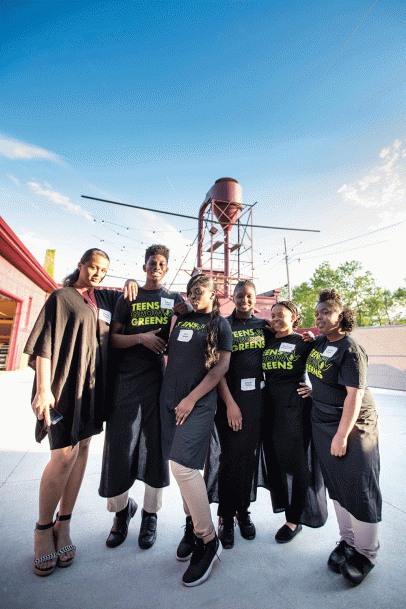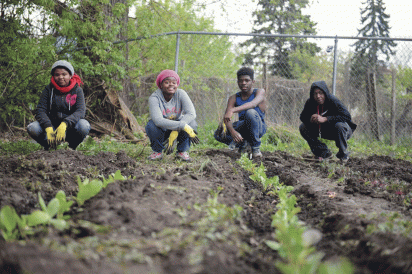Higher Education of Teens Grow Greens
Charlie Uihlein knew he was meant to work with teens. While teaching at Messmer High School, he soon realized there was something missing from the curriculum. He began to look for a different type of education—where students could develop and cultivate vocational skills through hands-on experience.
After spending a summer teaching experiential education in nature, an idea started to take shape. Not long after, Charlie and his wife, Rachel, founded Teens Grow Greens (TGG), a 501(c)(3) nonprofit organization where teens learn, grow, and go. “The garden is a dynamic classroom,” Charlie says. “It takes the pressure off because you can talk while you plant, and the teens feel comfortable and useful.”
Edible Milwaukee sat down with Charlie and two of his staff members, Education Director Arianna Williams and Education Coordinator Ryan Graham, to learn more about the organization’s roots, how it works and upcoming events.
EM: How did your background and personal interest in health and nutrition help shape the scope of the Teens Grow Greens?
Charlie: Put simply, healthy children learn and live better. We wanted to create an experience around nutrition and overall health, so we paired discussions and goal setting with growing, cooking and selling food. Once the teens see how the food is grown and can be prepared to taste good at a reasonable price they’re more open to eating healthy.
Personally, I love how you can get so attached to a homegrown tomato. There’s a type of emotional connection mixed with pride that you just don’t get shopping at a supermarket. Plus homegrown tomatoes taste better.
EM: Teens Grow Greens is a paid internship. Can you tell us more about the application process, curriculum and post-graduation support?
Ryan: Arianna and I travel to any high school in the Milwaukee area that shows interest in the program. After a brief informational meeting, we hand out applications. Whoever is interested in the job fills it out and sends it back to us. Almost everyone who fills out an application gets an interview.
Arianna: The internship starts in February and goes until November. Just like a job in the “real world,” interns are required to call ahead if they can’t make it to class, which is every Tuesday and Thursday from 4:30p.m. to 6:30 p.m. and some Saturdays. Too many unexcused absences, disorderly conduct or failure to accomplish tasks and meet deadlines are grounds for firing.
C: The nine-month curriculum gives the interns valuable communication, critical thinking, and business skills through team building and community service. We encourage self-efficacy, confidence, and belief in their own abilities.
A: Last year, we had this student who actually attended Messmer, and she was really quiet. Like, she’d be sitting at a desk and you’d forget she was there-kind of quiet. She stayed like that for probably five months, and then all of a sudden, she blossomed. Now she has two jobs, one with the Milwaukee Bucks and the other with Metro Market, and she still attends Messmer as a senior. I’ve talked to her multiples times outside of Teens Grow Greens, and I don’t think all that would have happened without this program.
C: After the internship, we support our graduates through quarterly meetings, connections to employment and the offer to come back and volunteer with Teens Grow Greens. Take Ryan for example …
R: Yeah, I was an intern in 2015, and I didn’t like the idea of leaving. So I came back and helped with the interviewing and hiring process, and officially joined the team.
EM: Coming back to how Teens Grow Greens teaches interns real life experience, can you touch on some of the assignments or projects required of them?
R: The Entrepreneur Unit is the last one. We help the interns develop a resume and prepare for an interview. Their final project is to make a product they can sell at a local market with a budget of 100 dollars, and then make a profit. My year, I made chapstick and sold it at the Newaukee Night Market. It was the most money I ever made at a market.
A: The Night Market is always an intern favorite because there’s music and dancing, and it’s only once a month. We usually do really well there, and we’re already signed up to be there this year.
EM: Charlie, we understand you’re now working with Teens Grow Greens full-time. What is the most rewarding thing about working with these young people?
C: The most rewarding thing is having the teens realize something about themselves that they didn’t think they could do before. I picture one of them coming home after a moment like this and looking at themselves in the mirror and being genuinely surprised about what they’ve accomplished!
I’ve seen examples of this firsthand, like when a teen finds out they are excellent at talking to people and selling our acai bowls with homemade granola, or a graduated intern heading into an interview and receiving their first job outside of Teens Grow Greens. In the end, we want them to be self-reliant. And any person needs these moments to really believe in themselves and what they’re capable of.





